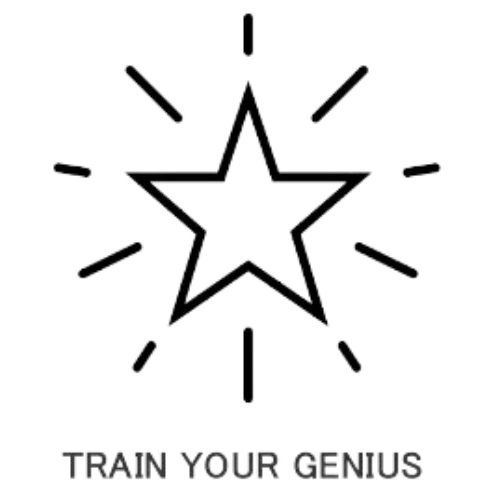DYSCALCULIA

Overview
With dyscalculia, you have a choice of two worlds - Disability or Genius. We will show you both worlds. You get to choose which world you want to live in.
Dyscalculia disrupts the brain’s ability to process numerical information and perform mathematical operations. People with dyscalculia often struggle with basic arithmetic, such as addition, subtraction, multiplication, and division. They may find it challenging to grasp concepts like bigger vs. smaller, understand the relationship between numbers and quantities, and remember math facts like times tables. This difficulty can extend to more abstract mathematical concepts and everyday tasks involving numbers, such as telling time, handling money, and measuring ingredients in a recipe.
The symptoms of dyscalculia typically become apparent in childhood, especially when children start learning basic math. However, it can also be diagnosed in adults who have had lifelong difficulties with math.
Dyscalculia is not related to overall intelligence; individuals with this condition can be just as intelligent and capable as their peers. The exact cause of dyscalculia is not fully understood, but it is believed to be related to differences in brain function and structure. This means that people with dyscalculia have brains that process information differently, which can lead to unique strengths and challenges. While there is no cure for dyscalculia, various strategies and interventions can help individuals manage their difficulties and improve their math skills. These may include specialized teaching methods, the use of visual aids and manipulatives, and technology tools designed to support mathematical learning.
Understanding and supporting individuals with dyscalculia is crucial for helping them achieve their full potential and navigate the challenges they face in both academic and everyday settings.
At the other end, dyscalculia have many gifts and skills.
Dyscalculia genetics do not go away. Dyscalculia gifts come with challenges. Both are summarized in the sections below.
Dyscalculia Gifts
Dyscalculia genetics come with many gifts. Here are some of the most common:
1. Creative Problem-Solving: People with dyscalculia often approach problems from unconventional angles. Their unique perspective can lead to innovative solutions that others might not consider.
2. Strong Verbal Skills: Many individuals with dyscalculia excel in verbal communication. They may have a talent for storytelling, writing, or public speaking, which can be valuable in various professional and personal contexts.
3. Empathy and Emotional Intelligence: Experiencing difficulties with math can foster a deep sense of empathy and understanding for others facing challenges. This heightened emotional intelligence can be a significant asset in interpersonal relationships and careers that require strong people skills.
4. Attention to Detail: While they may struggle with numbers, individuals with dyscalculia often have a keen eye for detail in other areas. This can be particularly useful in fields that require meticulous attention, such as editing, design, or quality control.
5. Resilience and Perseverance: Overcoming the obstacles associated with dyscalculia can build resilience and a strong work ethic. These individuals often develop a tenacious attitude and are not easily discouraged by setbacks.
6. Visual and Spatial Skills: Some people with dyscalculia have strong visual and spatial reasoning abilities. They may excel in areas such as art, architecture, or engineering, where these skills are highly valued.
7. Holistic Thinking: Instead of focusing on individual details, individuals with dyscalculia may be adept at seeing the bigger picture. This holistic thinking can be advantageous in strategic planning and creative endeavors.
8. Adaptability: Living with dyscalculia often requires finding alternative methods to complete tasks. This adaptability can make individuals more flexible and resourceful in various situations.
9. Collaboration Skills. Due to their challenges with math, individuals with dyscalculia often learn to collaborate effectively with others, leveraging their strengths and seeking help when needed. This can make them excellent team players.
10. Innovative Thinking: The need to find unique ways to cope with dyscalculia can foster innovative thinking. These individuals may come up with creative approaches and solutions that are outside the conventional framework.
Recognizing and nurturing these strengths can help individuals with dyscalculia thrive in their personal and professional lives. By focusing on their unique abilities, they can build confidence and achieve success in various fields.
Dyscalculia Challenges We Overcome
There are challenges that are faced by those with dyscalculia. Some of them are listed below.
1. Basic Arithmetic and Number Sense
Individuals with dyscalculia often struggle with basic arithmetic operations such as addition, subtraction, multiplication, and division. They may also have difficulty understanding number concepts and relationships, which can make even simple calculations challenging.
2. Memory and Recall
Remembering mathematical facts, sequences, and procedures can be particularly difficult. This includes recalling multiplication tables, steps in long division, or even the order of operations.
3. Time Management
Understanding and managing time can be a significant challenge. This includes reading clocks, estimating time intervals, and managing schedules.
4. Spatial Awareness and Direction
Dyscalculia can affect spatial reasoning, making it hard to understand directions, read maps, or judge distances. This can also extend to difficulties in understanding geometric concepts.
5. Handling Money
Managing finances, such as counting money, making change, and budgeting, can be particularly stressful and confusing for individuals with dyscalculia.
6. Anxiety and Self-Esteem
The constant struggle with math-related tasks can lead to anxiety, especially in academic settings. This anxiety can further hinder performance and contribute to low self-esteem.
7. Abstract Concepts
Grasping abstract mathematical concepts, such as algebra or calculus, can be extremely challenging. This often requires a higher level of numerical understanding and abstract thinking.
8. Daily Life Activities
Simple daily activities that involve numbers, such as cooking (measuring ingredients), shopping (calculating discounts), or even playing games that involve scoring, can be difficult.
9. Pattern Recognition
Recognizing and understanding patterns, which is a fundamental skill in mathematics, can be impaired. This affects the ability to predict sequences or understand mathematical relationships.
10. Mental Math
Performing calculations in one’s head, known as mental math, is often very challenging. This can affect quick decision-making in situations that require numerical reasoning.
Understanding these challenges is crucial for providing effective support and interventions for individuals with dyscalculia. With the right strategies and tools, many of these difficulties can be managed, allowing individuals to achieve their full potential.
Diagnosis
Diagnosing dyscalculia involves a comprehensive evaluation process that typically includes several steps to ensure an accurate diagnosis. Here’s an overview of how dyscalculia is diagnosed:
1. Initial Screening
The process often begins with an initial screening by a teacher, parent, or primary care physician who notices persistent difficulties with math that are not explained by other factors.
2. Comprehensive Evaluation
A detailed evaluation is conducted by a team of professionals, which may include psychologists, learning specialists, and educators. This evaluation typically involves:
Standardized Testing: Specific math skills are assessed using standardized tests designed to measure mathematical abilities relative to age and grade level.
Cognitive Assessments: General cognitive abilities are evaluated to rule out other potential causes of math difficulties, such as intellectual disabilities or other learning disorders
Academic Performance Review: A review of the individual’s academic records and performance in math-related subjects helps to identify patterns and areas of difficulty
3. Family and Developmental History
Gathering information about the individual’s family history and developmental milestones can provide insights into potential genetic or environmental factors contributing to dyscalculia.
4. Behavioral Observations
Observations of the individual’s behavior in different settings, such as the classroom or at home, can help identify specific challenges and how they manifest in everyday activities.
5. Interviews and Questionnaires
Interviews with the individual, parents, and teachers, along with questionnaires, can provide additional context about the individual’s experiences and difficulties with math.
6. Ruling Out Other Conditions
It is important to rule out other conditions that might cause similar symptoms, such as ADHD, generalized anxiety disorder, or other learning disabilities.
7. Diagnosis and Recommendations
Based on the comprehensive evaluation, a diagnosis is made. If dyscalculia is diagnosed, the team will provide recommendations for interventions and support strategies tailored to the individual’s needs.
Conclusion
Diagnosing dyscalculia is a multi-step process that requires careful consideration of various factors. Early and accurate diagnosis is crucial for providing effective support and interventions, helping individuals with dyscalculia to manage their challenges and succeed academically and in daily life.
Getting Started
Treating dyscalculia involves a combination of specialized instructional strategies, accommodations, and support to help individuals manage their difficulties with math. Here are some key components of effective dyscalculia treatment plans:
1. Specialized Instruction
Multisensory Teaching: Using sight, touch, hearing, and movement to teach math concepts. This approach helps students understand numbers and symbols through different sensory experiences.
Concrete-Representational-Abstract (CRA) Approach: Teaching starts with concrete objects (like blocks), moves to representational (pictures), and finally to abstract (symbols) to build a deep understanding of math concepts.
2. Accommodations
Extended Time: Allowing extra time on tests and assignments to reduce pressure and anxiety.
Use of Calculators: Permitting calculators for basic arithmetic to help focus on higher-level math concepts.
Manipulatives: Using physical objects like blocks or beads to help visualize math problems.
3. Assistive Technology
Math Apps and Software: Tools that provide interactive and engaging ways to practice math skills. Examples include graphing tools, math notation tools, and apps that reinforce basic number concepts.
Graphic Organizers: Visual aids that help organize information and solve problems step-by-step.
4. Behavioral and Emotional Support
Anxiety Management: Techniques to reduce math anxiety, such as relaxation exercises, positive reinforcement, and creating a supportive learning environment2.Counseling and Therapy: Professional support to address any co-occurring issues like ADHD or anxiety, which can exacerbate difficulties with math.
5. Consistent Practice and Reinforcement
Frequent Practice: Regular and consistent practice of math skills to reinforce learning and build confidence.
Error Analysis: Encouraging students to learn from their mistakes and understand where they went wrong to improve their problem-solving skills.
6. Parental and Teacher Involvement
Collaboration: Working closely with teachers, parents, and specialists to create a cohesive support system.
Individualized Education Plans (IEPs): Developing tailored education plans that outline specific goals, accommodations, and instructional strategies for the student.
Conclusion
A comprehensive treatment plan for dyscalculia involves a combination of specialized instruction, accommodations, assistive technology, emotional support, and consistent practice. By addressing the unique needs of each individual, these strategies can help manage the challenges of dyscalculia and promote success in math and beyond.
RESOURCES
Disclosure:
Some are affiliate links, which means, I might earn income. At no additional cost to you. I am an Amazon Associate, and earn from Amazon qualifying purchases. Your support is greatly appreciated!
SITE USERS ACKNOWLEDGE: THIS SITE DOES NOT OFFER ANY MEDICAL, LEGAL, PSYCHOLOGICAL, THERAPEUTIC, RELIGIOUS, OR OTHER PROFESSIONAL ADVICE TO USERS. PLEASE SEEK THE ADVICE OF COUNSELING PROFESSIONALS (Physicians, Therapists, Clergy, Qualified Business Advisors, Lawyers, Accountants, etc) as appropriate, regarding the evaluation of any specific information, opinons, advice, or other content.
THIS SITE AND ALL CONTENT AND SERVICES ARE PROVIDED FOR INFORMATION PURPOSES ONLY AND ALL CONTENT AND SERVICES PROVIDED THROUGH IT ARE PROVIDED "AS IS" WITH NO WARRANTIES WHATSOEVER FOR INFORMATION, ADVICE, SERVICES OR GOODS RECEIVED THROUGH OR LINKS PROVIDED IN THE SITE.
Resource: Neurodiversity Call with Felicia Nagamatsu
Book (Genius Approach) - The Gift of Learning by Ronald D. Davis and Eldon M. Braun
Dyscalculia as a Genius Gift
A view pioneered by Ron Davis. The Davis Method Programs.
More Resources Coming
© 2026 Train Your Genius
